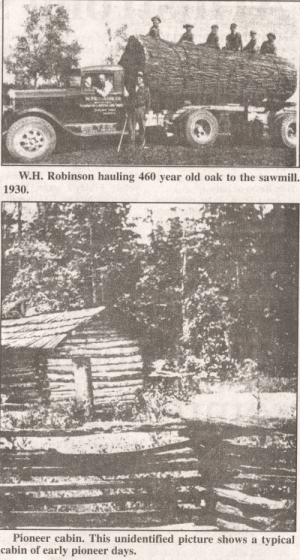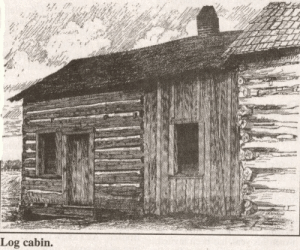
Window to the Past
Life hard in early Van Wert County
By BOB HOLDGREVE
EARLIEST HISTORY
James Gilliland and his family moved from near Gettysburg, Penn., to Ridge Township, Van Wert County, arriving in July 1835. (To get an idea of how long this trip took, it took three days to just come from the Big Auglaize River to Smith Hillís camp, west of the present Van Wert County Infirmary.)
After reaching his land, the father and his brother, Adam, cut small logs such as four men could raise and then called upon his two neighbors, named Hill and Mark, to help raise the house. Thus he had the first house in Ridge Township. It had only one room but made a comfortable home.
The glass and sash had been brought from Bucyrus. The roof was of clapboards split out of oak timber and held in place by poles, laid on so that their weight would hold down the clapboard.
The door was made of clapboards, shaved. The door lock was a latch made of wood, that of its own weight, dropped into a notch in a piece of wood on the inside of the door, and this formed a bolt which was worked with a string, passed through a hole in the door; to lock the door, all you had to do was go inside and pull in the string. From this originated the saying, "you will find the latch string out," which was always true in those times.
Bears were very destructive on the hogs and cornfields, at one time taking a good-sized hog out of a pen in the yard. A son of Mr. Gilliland had to walk around the corn field all day with the dog and a rattle trap, to scare the squirrels away and at night the coons and bears would destroy nearly half as much as the squirrels did in daylight.
At one time, Mr. Gilliland told some men in Van Wert that he would furnish the ammunition if they would come out and shoot the squirrels. Four of them came out and killed 240 squirrels. The writer and two of the neighbor boys carried home what they desired and left the rest. This was all done around one field and in a short time, the squirrels seemed to be as plentiful as ever.
The writer recalls that one night, the father came home and had scarcely got in the house when he heard a coon squall. He went out and killed it and threw it in the smoke house, but just got back into the house when he heard another, and this was repeated until he had killed nine. He went to bed while another was squalling, for he was tired out.
The next morning when he went out, he found that the dog had killed his coon, had laid it against the front door and laid there watching it.
That year, Mr. Gilliland sold over $100 worth of pelts, consisting of coon, bear and deer skins. Three buyers came from Fort Wayne and bid on them; each one took a wood chip and wrote his figure on them and the highest bidder, Mr. Ewing, got the pelts.
Mr. Gilliland and Smith Hill bought few for Ewing that year and took two wagon loads to Fort Wayne in the spring, two yoke of oxen drawing each wagon. The pelts were loaded on hay racks and each load was as large as a ton of hay.
At one time, M.H. McCoy caught a she wolf in a trap and dragged it home. That night, three of her pups followed the trail to the house and sat down in the dust in the road and set up a most dismal howl. The dog tried to jump through the window into the house, he was so badly scared.
At another time, McCoy heard a turkey gobble. Taking his gun, he went into the woods and secreting himself in a treetop that had fallen, he commenced calling the turkey. He could hear the turkey coming but just as it came in sight, he heard a twig break behind him and turning around, saw a wolf within 10 feet of him. He shot as it ran and wounded it but was too badly scared to make a good shot at it.
Mr. McCoy bought some land in section 16, Ridge Township, about 1855 for $9 an acre, and two or three years afterwards sold over $200 worth of walnut and ash timber off of only two acres of the land.
A large white ash tree stood on the M.H. McCoy farm. When McCoy started out one morning, he told his wife that she would feel the earth tremble but it was just sundown when the tree fell. It was seven feet across the stump; the first log, 12 feet long, made 1,266 feet of lumber and the tree 6,660 feet. (Remember this was cut with an axe and a one-man crosscut saw, no chainsaws then.) Dr. William Smith furnished the oxen and meed boat to haul the logs on the snow.
There was a walnut tree on the Gilliland farm that measured 25 feet around, two feet above the ground. When cut, the tree made five logs, each 12 feet long to the first limb, and a good log above that; and a log two feet thick out of the first limb. After trying in every way to haul it to the sawmill, as a last resort, he split it into quarters with powder.
Shortly before moving to Van Wert County, this was in 1833, James Gilliland and a Mr. Wise walked from Gettysburg, Penn., to Fort Wayne and back. In 1834, Peter Wills (whose relatives still live around here), a brother-in-law of Mr. Gilliland, moved to near Tiffin and the rest of the Gilliland family moved to Bucyrus and remained there during the summer of 1835, raising a crop on the farm of a Mr. Shaffner.
While at Bucyrus, two of the brothers went hunting and got lost. An old Indian piloted them out of the woods and then told them he could tell them how they could go hunting and never get lost. They told him they wished he would. He said, "Go out all around the field and keep looking at the fence."
At another time, two of them went out hunting and were very hungry, when they came to an Indian wigwam. There was no one at home. They went in and found some jerked meat and were eating it when an Indian came in. He looked at them a moment and asked, "White man like wolf meat?" That satisfied their appetite. The Indians had jerked the wolf meat for their dogs.
During the fall of 1835, three men stopped at the Gillilandís for a drink and said that the family would soon have neighbors, as they were going to lay out a town about three miles west (Van Wert). The Gillilands afterward learned these were Aughenbaugh, Riley and Marsh.
John Gilliland was a blacksmith and had moved to Logansport, Ind. His mother and brothers wanted him to move here on a farm but to do so, he would have had to come around by way of Piqua. So the brothers and Peter Wills cut the road from four miles west of Van Wert through to Fort Wayne. After that, Fort Wayne was the milling point, being 35 miles distant instead of 72 to Piqua.
Once James Gilliland went to Fort Wayne to have his grain milled and found about two acres, covered with wagons waiting for their grist. He unloaded his grain and then asked the miller how soon he could get his grinding and was told that it would not be under two weeks. Gilliland said that his family would starve before that time as they did not have provisions to last that long. Some of the men spoke up and said that he was no better than they were, and they had been there two weeks.
Mr. Gilliland chained his oxen to the wagon and fed them. As soon as it was dark he bought a gallon jug, had it filled with the best brandy and then took it up and hid it in the bran pile. He told the miller that he had hid something nice in the bran pile and that when the hopper was about empty he should go down stairs and he (Gilliland) would throw in his grain.
The miller told him that the others would not let him (the miller) grind it. Gilliland replied that he was a miller by trade and would grind it himself, and so it was arranged. He untied his sacks and was ready when the hopper was empty. He had more than half his grain in the hopper before the others noticed what he was doing. Then they caught him and some held him while others hunted up the miller. The miller came up in a rage, apparently, and a quarrel ensued. The miller threw off his coat and Mr. Gilliland did the same.
The miller finally said, "Well, hereís a fool; I wonít grind his grain, and he will spoil his flour and we will be rid of him."
Mr. Gilliland appeared to be disappointed because the miller would not grind the grist and begged the miller to grind it, but the miller went off, refusing to touch it. That partly pacified the others. Mr. Gilliland ground his grist and started home the next morning.
Smith Hill was a great bee hunter weighing nearly 200 pounds. One time, he climbed a tree on the Jacob Balyeat farm, 104 feet high, and cut out the honey. At another time, he found a bee tree north of the ridge and with one or two of his nephews, went to get the honey.
For some reason, they did not take a gun. The dogs began barking and when Hill and his nephews came up, they found a bear backed up against a tree fighting the dogs. Mr. Hill approached the bear with his axe, and the dogs being encouraged by his presence, made a more furious attack; the bearís attention being thus attracted by the onslaught of the dogs, Hill hit it, burying the bit of the axe nearly to the handle in the side of its head. About the only thing the dogs would not tackle was a porcupine.
Mr. F. Richey and James Gilliland went to the State Fair at Columbus, walking there and back. They each bought a Durham calf: one 6 months old and the other 7 months, and drove them home. They paid $50 apiece, when the price of an ordinary cow or steer was $10 to $12. That was the first effort made to improve the stock of cattle in Van Wert County.
William Stanford, better known as Bill Myers, and Sam Maddox, both petty thieves, spent a portion of their time in jail together. The ceiling of the jail had dried out to such an extent so that they could pry the logs apart so they could climb out between them. They would get out at night, steal some chickens and other eatables, go to Myers house and have a feast and be back in the jail by morning.
(Remember, this did not happen in the old west, but between Delphos and Van Wert.)
From History of Van Wert County, by Gilliland.


Compiled by Robert Holdgreve
Delphos Historical Society
July 17, 2004 Delphos Herald Newspaper